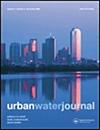城市水安全:应对气候变化的水供应和需求管理策略
IF 1.6
3区 环境科学与生态学
Q3 WATER RESOURCES
引用次数: 2
摘要
摘要了解气候变化对水资源的影响是当务之急。本文进一步探讨了水从业者对应对未来气候影响以实现城市水安全的供水侧和需求侧管理措施的看法。采访了澳大利亚昆士兰地区城市水务局的水务专业人员。从水从业者的角度来看,地表水仍然是该地区的高度优先水资源,尽管气候变化预计会使该地区的地表水资源更加脆弱。在水务从业人员调查长期水解决方案时,很少将气候变化风险视为选择标准。尽管非定价水需求管理政策被用于减少该地区的水需求,但基于定价的水需求管理工具被水务专业人员认为是减少研究区域水需求的最有效工具,如果实施的话。本文章由计算机程序翻译,如有差异,请以英文原文为准。
Urban water security: water supply and demand management strategies in the face of climate change
ABSTRACT Understanding the knowledge of climate-change impacts on water-resources is a priority. This article goes a step further with the main objective of this study to explore water-practitioners’ viewpoints regarding the water supply-side and water demand-side management measures in coping with future climatic impacts to achieve urban water security. Interviews were conducted with water-professionals from regional urban water authorities of Queensland, Australia. From a water-practitioner’s viewpoint, surface water is perceived to remain a high-priority water resource for the region, although climate-change is projected to make this resource more vulnerable in the area. Climate-change risks have rarely been considered as a selection-criterion when long-term water solutions were investigated by water-practitioners. Although non-pricing water demand management policies were used to reduce water demand in the region, pricing-based water demand management tools are perceived by the water-professionals to be the most effective at reducing water demand in the study area, if implemented.
求助全文
通过发布文献求助,成功后即可免费获取论文全文。
去求助
来源期刊

Urban Water Journal
WATER RESOURCES-
CiteScore
4.40
自引率
11.10%
发文量
101
审稿时长
3 months
期刊介绍:
Urban Water Journal provides a forum for the research and professional communities dealing with water systems in the urban environment, directly contributing to the furtherance of sustainable development. Particular emphasis is placed on the analysis of interrelationships and interactions between the individual water systems, urban water bodies and the wider environment. The Journal encourages the adoption of an integrated approach, and system''s thinking to solve the numerous problems associated with sustainable urban water management.
Urban Water Journal focuses on the water-related infrastructure in the city: namely potable water supply, treatment and distribution; wastewater collection, treatment and management, and environmental return; storm drainage and urban flood management. Specific topics of interest include:
network design, optimisation, management, operation and rehabilitation;
novel treatment processes for water and wastewater, resource recovery, treatment plant design and optimisation as well as treatment plants as part of the integrated urban water system;
demand management and water efficiency, water recycling and source control;
stormwater management, urban flood risk quantification and management;
monitoring, utilisation and management of urban water bodies including groundwater;
water-sensitive planning and design (including analysis of interactions of the urban water cycle with city planning and green infrastructure);
resilience of the urban water system, long term scenarios to manage uncertainty, system stress testing;
data needs, smart metering and sensors, advanced data analytics for knowledge discovery, quantification and management of uncertainty, smart technologies for urban water systems;
decision-support and informatic tools;...
 求助内容:
求助内容: 应助结果提醒方式:
应助结果提醒方式:


